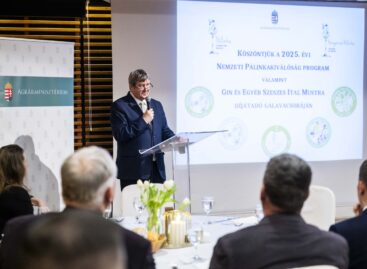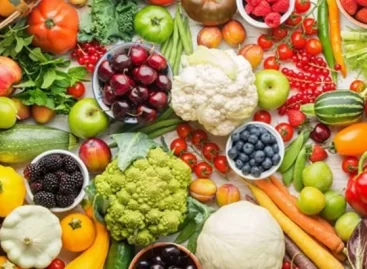An extraordinary adaptation is needed in agricultural production
It is impossible to prepare for the frequent changes that have affected agricultural producers every day in the past two years. This summer, the extremely low purchase prices of grain and oilseeds are causing challenges, stated Zsolt Feldman, the State Secretary responsible for agriculture and rural development of the Ministry of Agriculture at the IV. At the opening of Szentlőrinci Mezőgépnapok.

(Photo: AM/Tibor Vermes)
The state secretary stated that a clear explanation would be needed from the grain trading market players about the hugely increased difference between the domestic purchase prices and the grain prices listed on the Paris Stock Exchange. As he put it, the grain market was extremely disturbed by the Russian-Ukrainian war, the complete exemption from customs duties granted to Ukraine, and the continuous change in transport options due to the blockade of the Black Sea ports, which pushed the prices of grain and oilseeds first to the sky and then to the bottom, the Ministry of Agriculture listed Secretary of State for Agriculture and Rural Development. In his opinion, it is impossible to adapt to all this from one moment to the next. For the sake of the producers, it was therefore necessary to limit Ukrainian grain imports to the region, first under national and then EU powers. The restriction is working, transit goods are leaving the country and the import ban – despite the rumors – is not being disguised as millets made from various grains and oilseeds, he said.
This is the reason for the price difference experienced with wheat
Regarding crop purchase prices and demand, Zsolt Feldman highlighted that in recent years there has been a HUF 5-15,000/ton price difference between the quotation prices of the leading Paris commodity exchange, MATIF, and Hungarian purchase prices for wheat, with transport costs due to Hungary’s distance from seaports can even be supported. But now, there is a price difference of at least HUF 30,000/ton between the Paris listing prices and the purchase prices announced by the traders. According to the state secretary, this is no longer justified either by the cost of transport or the development of demand, which is why he expects a clear explanation from the market players of the Hungarian grain trade, because the market and commercial effects of the war events, the import restrictions that are intended to be maintained even after September 15 or the evolution of the forint-euro exchange rate does not support this. We can only hope – he said – that the attitude of the traders is not a kind of satisfaction for the fact that in 2022, some of the Hungarian producers – having misjudged the market conditions – wanted to sell their grain at a higher price level in view of their increased production costs.
Zsolt Feldman refuted the information that grain exports had stopped, stating that while last year, despite the extreme drought, about 5.8 million tons, this year 2.5 million tons of grain and oilseeds have left the country so far.
Regarding the direct support system of the new Common Agricultural Policy, the state secretary said that this year is a learning year, and the new EU expectations require significant adaptation from producers. For those connected with agriculture, it is important to highlight that agricultural subsidies are not a gift, behind them you have to meet requirements that involve additional costs or a decrease in production, the system tries to compensate for this. It is not expected that the market and production environment that was used until two years ago could continue in field crop cultivation, so Hungarian agriculture must adapt to the changed conditions in several areas. Zsolt Feldman named three such areas: purchasing common input materials in order to reduce costs, transforming the production structure of farmers towards crops with greater added value and increasing efficiency. These are the foundations of successful management, he said. In the support cycle until 2027, rural development subsidies can help all farmers to adapt. The department compiles the schedule of new tenders in September. On the occasion of the Field Machinery Days in Szentlőrinci, the State Secretary also spoke about the fact that with the Ministry of Agriculture’s call for tenders to support the transition to precision farming, farmers can purchase 6,000 tractors suitable for site-specific work, 5,700 implements and 1,300 combines.
AM
Related news
The Hungarian Food Book is 50 years old
🎧 Hallgasd a cikket: Lejátszás Szünet Folytatás Leállítás Nyelv: Auto…
Read more >The National Pálinka Excellence Program 2025 awards were presented
🎧 Hallgasd a cikket: Lejátszás Szünet Folytatás Leállítás Nyelv: Auto…
Read more >Related news
Lidl guarantees fairer prices for cocoa farmers
🎧 Hallgasd a cikket: Lejátszás Szünet Folytatás Leállítás Nyelv: Auto…
Read more >40 secure jobs, sustainable solutions – new BURGER KING® in Csepel
🎧 Hallgasd a cikket: Lejátszás Szünet Folytatás Leállítás Nyelv: Auto…
Read more >








